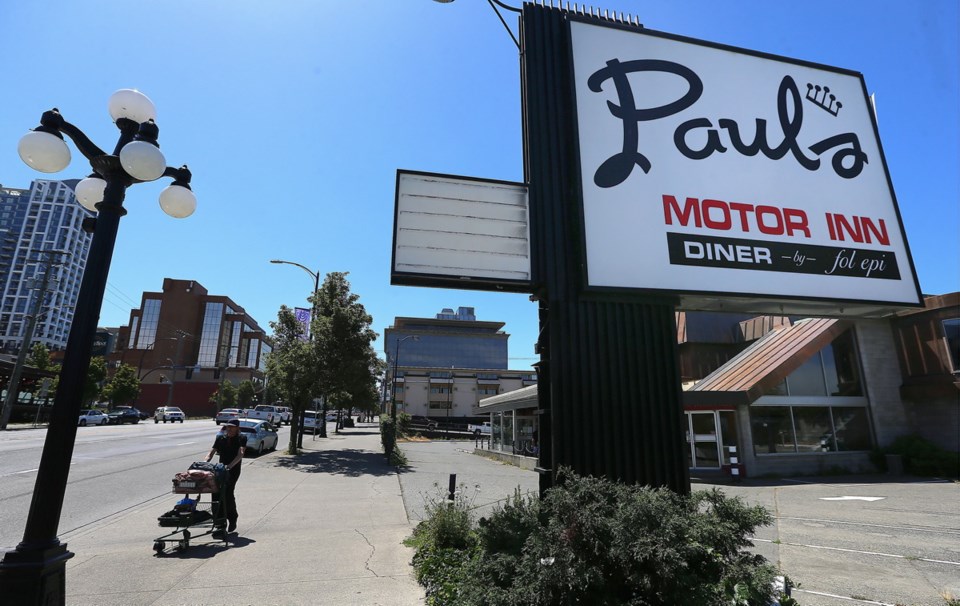B.C. Housing paid about $15 million — several million above the assessed value — when it bought Paul’s Motor Inn to provide shelter and support for people without homes.
The provincial agency says that before going ahead with the purchase in June, it had its own evaluation done that placed a higher value on the hotel and its 1.3-acre site at 1900 Douglas St.
“B.C. Housing received an independent appraisal, which was higher than the price paid for the site,” spokeswoman Laura Matthews said in a statement. “The assessed value was based on the existing operation, while the appraisal looked at the value of future redevelopment, as that is our intent for purchasing.”
B.C. Housing tackled two immediate crises, the COVID-19 epidemic and opioid overdoses, when it bought Paul’s. The purchase took place as the province was moving quickly to find housing for campers in Victoria and 91Ô´´. Several properties were bought or rented in the two cities.
Paul’s is being used to house people who had been living in tents on Pandora Avenue and at Topaz Park. The province said that while the property is being used for housing now, the long-term plan is to redevelop the site to create affordable housing.
Whether properties are commercial or residential, it is not uncommon to see a difference between assessed values and purchase prices. That can be for several reasons.
The B.C. Assessment Authority assessed Paul’s at $8.757 million last July, most of the value being in the land.
Generally speaking, income-producing properties are purchased on the basis of their revenue, said Gerry Marolla, B.C. Assessment deputy assessor for 91Ô´´ Island.
When it comes to determining the assessment for hotel properties, “we base it on their performance. We consider the average daily room rates, we consider their occupancy, we consider their revenue-available-per-room. Then we look at what the expenses are associated with those types of properties.
“At the end of the day, what we are doing is creating an estimate of market value based on the performance of that property.”
The assessed value for Paul’s seemed reasonable when considering sales taking place at the time, Marolla said.
In the past couple of years, demand for land has been very strong in Victoria, he said. In the case of Paul’s, the land value is worth more than the income stream for the hotel.
“There’s upward pressures being placed in the market by buyers,” he said. “This one happens to be the province but there are a lot of individuals out there buying properties that are driving the market value that we are seeing in and around Victoria.”
The province’s decision to buy accommodation properties to convert to social housing is another dynamic starting to be seen in the marketplace, he said.
When a sale takes place, B.C. Assessment looks at the reason for the purchase to see if there is additional value to the purchaser, one of the factors considered in an assessment, Marolla said.
B.C. has also purchased a couple of 91Ô´´ hotels to provide housing for tenters. As well, it bought the 65-unit Comfort Inn and Suites on Blanshard Street for $18.5 million in May, above the assessment of $14.175 million, for tenters to live.
The city of Victoria recently bought two parcels in the 900-block of Pandora Avenue for $9.595 million, slightly above the assessed value of $9.504 million.
For both the Comfort Inn and the Pandora sales, the stated plan is to redevelop them to create affordable housing, similar to the Paul’s site.
Randy Holt, real estate agent with Devencore Realty Victoria, said the price paid per square foot for Paul’s compares favourably with other recent downtown land sales. Regarding the Paul’s and Pandora Avenue sales, Holt said: “While each of these may be viewed as ‘one-off’ transactions because of the unique needs and motivation of the buyer, they can also be seen to reflect the continuing strength and long-term upward trend in the value of downtown development sites.”



